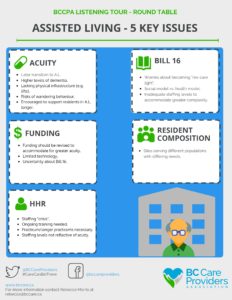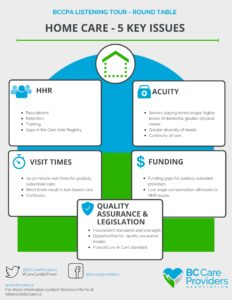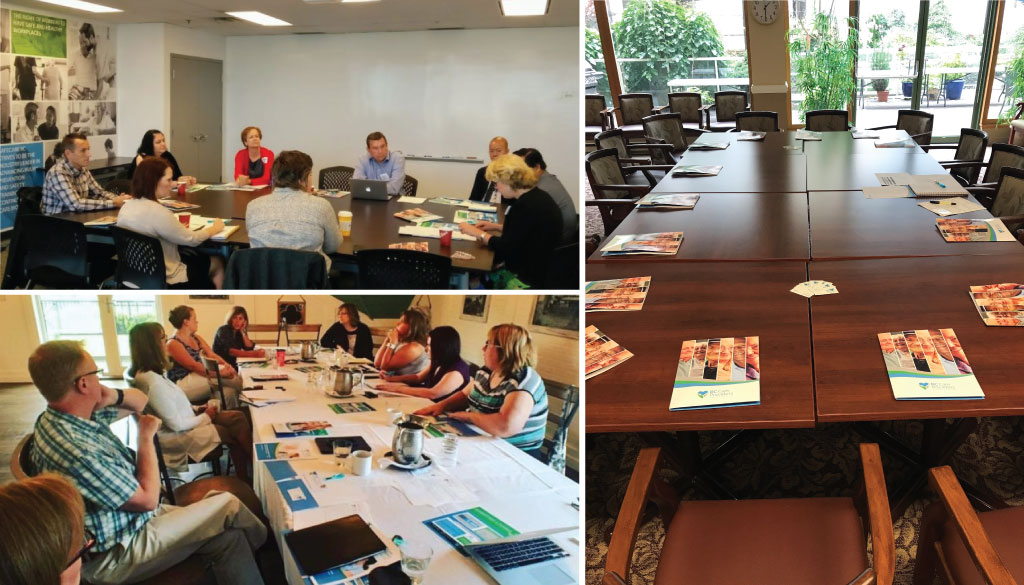This fall BCCPA continued the most recent leg of its Listening Tour, in order to hear from assisted living and home care operators. The tour consisted of eight roundtable events–two of which took place by teleconference, and six which occurred in-person, at three locations:

BCCPA extended invitations beyond our current membership to include representation from across the sector. In total, we heard from 79 participants. The roundtables were facilitated by Mike Klassen, VP of Communications & Stakeholder Relations, Rebecca Morris, Manager of Public Affairs for Assisted Living & Home Care, and Lara Croll, Health Human Resource Analyst.
“It is incredibly important to us that we hear from our members both within and outside of the Lower Mainland, and this Listening Tour has enabled us to do that. While there are a lot of commonalities for providers across regions, there are also some salient differences which we need to remain attuned to,” says Klassen.
Examples of regional differences include how Health Authority policy impacts providers in different areas, and how demographic differences nuance health human resource challenges, including care aide availability and retention.
HHR issues were foremost for both home care and assisted living providers.
“Care providers are telling us that the sector is facing a staffing crisis – there is a dearth of care aides and hospitality staff available for employment. Even when providers are able to successfully recruit, staff retention is an issue,” says Croll. “BCCPA has heard that we need to advocate for change on this matter and we are working with provincial and federal governments to develop a response to this very challenging situation.”

If the public gets better understanding of the intrinsic benefits to employment in the continuing care sector, including making a difference in the lives of seniors, many felt it would encourage more people to consider seniors’ care as a career option.
In addition to recruitment and retention issues, both and home care providers spoke to opportunities for ongoing training as well as the integration of practicums, or longer practicums, to ensure staff suitability leading up to hiring.
Throughout the tour, changing acuity was also a notable theme. home care providers observed that the seniors they were supporting are frailer than ever and are living with higher levels of dementia. For providers, this has made delivering care more challenging, especially within visit times which were considered by many as being too short. They also felt that greater acuity has made continuity more necessary, as developing relationships with the senior being supported can make delivering intimate care, or care to a person living with dementia, much more successful.
In assisted living, participants felt that resident acuity has increased considerably over the last 5 to 10 years, and they had concerns that this would only increase following the implementation of Bill 16. Some were concerned that many homes were not equipped with the necessary infrastructure to provide more complex care. In addition, others pointed to the challenges of accommodating diverse populations with differing needs, such as supporting people who require more support as a result of physical frailty, while also supporting people who need more support as a result of dementia. Specifically, they identified that this made programming more challenging, and has been detrimental to resident satisfaction.
Further concerns on Bill 16 include apprehensions that pending legislation would move the care delivery model from a “social model” of care toward a “health care model”, or “res-care light”. For example, participants wondered how they would support residents who may experience wandering behaviours related to dementia, an issue already of growing concern. These reflections are consistent with the Assisted Living Tenancy Task Force Review, which was released by BCCPA in July 5, 2017 to determine the impact of Bill 16’s regulatory changes on assisted living operators, as well as to assess other issues which are of importance to the continuing care sector. The task force determined that more clarity is needed as to the impact the regulation changes will have on assisted living operators and the people they support.
“Several participants are unsure if funding changes will follow the new legislation, to support what they are assuming will be changing levels of acuity,” says Morris. “Bill 16 remains an important topic for our members and we are following the issue closely.”
Home care providers, particularly those who deliver publicly subsidized care through government contracts, also felt that funding was a challenge. In general, they would like to see longer visit times, through which they feel they could provide better care and better working environments for staff.
“Everyone appreciates consistency,” says Klassen. “It benefits both the worker and the senior receiving care, but scheduling can become more challenging when visit times are shorter.”
Quality assurance in the sector was a significant concern for home care providers across the province. They saw opportunities to implement a voluntary program that would ensure quality care, empower consumers to make informed choices, and set those delivering high quality care apart from those who may not be achieving high standards, all while avoiding excessive or unnecessary regulation.
“BCCPA is in the early stages of exploring the feasibility of implementing a voluntary, quality assurance program. This is a direct result of what we’ve been hearing through this Listening Tour, and through other engagement with the home care sector,” says Morris.
We will be carefully considering the key issues gleaned from the roundtable events and will be using this information to inform our research and advocacy, including projects such as the Quality Assurance Feasibility project, the upcoming Home Health White Paper (expected to be released this winter), and our approach to Bill 16.
Those with questions about the Listening Tour are encouraged to contact Rebecca Morris at rebecca@bccare.ca.





